| Listing 1 - 9 of 9 |
Sort by
|
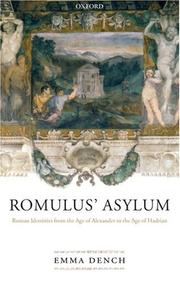
ISBN: 0198150512 1282199307 0191710016 9786610753406 9786612199301 0191518344 1280753404 1423753046 9780198150510 Year: 2005 Publisher: Oxford Oxford University Press
Abstract | Keywords | Export | Availability | Bookmark
 Loading...
Loading...Choose an application
- Reference Manager
- EndNote
- RefWorks (Direct export to RefWorks)
Ethnicity --- Group identity --- National characteristics, Roman. --- National characteristics, Roman --- Ethnicity - Rome --- Group identity - Rome
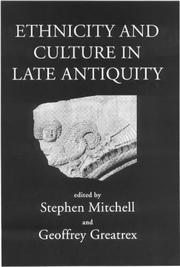
ISBN: 0715630431 9780715630433 1914535057 Year: 2000 Publisher: London Duckworth
Abstract | Keywords | Export | Availability | Bookmark
 Loading...
Loading...Choose an application
- Reference Manager
- EndNote
- RefWorks (Direct export to RefWorks)
Ethnicity --- Ethnicité --- Congresses --- Congrès --- Rome --- Civilization --- Congresses. --- Ethnic relations --- History --- Civilisation --- Relations interethniques --- History. --- 27 "03" --- Kerkgeschiedenis--?"03" --- Ethnicité --- Congrès --- Ethnicity - Rome - History.
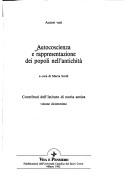
ISBN: 8834303512 9788834303511 Year: 1992 Volume: v. 18 49 Publisher: Milano Vita e pensiero
Abstract | Keywords | Export | Availability | Bookmark
 Loading...
Loading...Choose an application
- Reference Manager
- EndNote
- RefWorks (Direct export to RefWorks)
Ethnicity --- Group identity --- Civilization, Classical. --- Ethnicité --- Identité collective --- Civilisation ancienne --- -Ethnicity --- -Group identity --- -Civilization, Classical --- Classical civilization --- Civilization, Ancient --- Classicism --- Collective identity --- Community identity --- Cultural identity --- Social identity --- Identity (Psychology) --- Social psychology --- Collective memory --- Ethnic identity --- Cultural fusion --- Multiculturalism --- Cultural pluralism --- Ethnicité --- Identité collective --- Civilization, Classical --- History --- Congresses --- Nationalism --- Greeks --- Attitudes --- Italic peoples --- Romans --- Ethnicity - Greece. --- Ethnicity - Rome. --- Group identity - Greece. --- Group identity - Rome. --- Nationalites --- Peuples
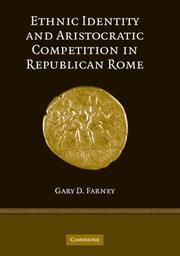
ISBN: 9780521863315 0521863317 Year: 2007 Publisher: Cambridge Cambridge university press
Abstract | Keywords | Export | Availability | Bookmark
 Loading...
Loading...Choose an application
- Reference Manager
- EndNote
- RefWorks (Direct export to RefWorks)
The ancient Romans are usually thought of as a monolithic ethnic group, though in fact they formed a self-consciously pluralistic society. In this book, Gary D. Farney explores how senators from Rome's Republican period celebrated and manipulated their ethnic identity to get ahead in Rome's political culture. He examines how politicians from these lands tried to advertise positive aspects of their ethnic identity, how others tried to re-create a negative identity into something positive, and how ethnic identity advertisement developed over the course of Republican history. Finally, in an epilogue, Farney addresses how the various Italic identities coalesced into a singular Italian identity in the Empire, and how Rome's experience with Italic groups informed how it perceived other groups, such as Gauls, Germans, and Greeks.
Ethnicity --- Group identity --- Aristocracy (Social class) --- Italic peoples --- Ethnicité --- Identité collective --- Aristocratie --- Italiotes --- History --- Histoire --- Rome --- History. --- Ethnicité --- Identité collective --- Ethnology --- Etruscans --- Collective identity --- Community identity --- Cultural identity --- Social identity --- Identity (Psychology) --- Social psychology --- Collective memory --- Ethnic identity --- Cultural fusion --- Multiculturalism --- Cultural pluralism --- Aristocracy --- Aristocrats --- Upper class --- Nobility --- Ethnicity - Rome - History --- Group identity - Rome - History --- Aristocracy (Social class) - Italy - Rome - History --- Italic peoples - History --- Rome - History - Republic, 265-30 B.C.
Book
ISBN: 9781905670468 190567046X Year: 2013 Volume: 120 Publisher: London University of London. School of advanced study. Institute of Classical Studies
Abstract | Keywords | Export | Availability | Bookmark
 Loading...
Loading...Choose an application
- Reference Manager
- EndNote
- RefWorks (Direct export to RefWorks)
Questions of ethnic and cultural identities are central to the contemporary understanding of the Roman world. The expansion of Rome across Italy, the Mediterranean, and beyond entailed encounters with a wide range of peoples. Many of these had well-established pre-conquest ethnic identities which can be compared with Roman perceptions of them. In other cases, the ethnicity of peoples conquered by Rome has been perceived almost entirely through the lenses of Roman ethnographic writing and administrative structures. The formation of such identities, and the shaping of these identities by Rome, was a vital part of the process of Roman imperialism. Comparisons across the empire reveal some similarities in the processes of identity formation during and after the period of Roman conquest, but they also reveal a considerable degree of diversity and localisation in interactions between Romans and others. This volume explores how these practices of ethnic categorisation formed part of Roman strategies of control, and how people living in particular places internalised them and developed their own senses of belonging to an ethnic community. It includes both regional studies and thematic approaches by leading scholars in the field--Publisher website.
Ethnicity --- Group identity --- National characteristics, Roman. --- Ethnicité --- Identité collective --- Romains --- Rome --- History --- Histoire --- National characteristics, Roman --- Romans. --- Etnologia --- Identitat col·lectiva --- Ethnicity. --- Group identity. --- Etnicitet --- Gruppidentitet --- Nationalkaraktär. --- History. --- historia. --- 265-30 B.C. --- 265-31 f.Kr. (senrepubliken). --- Rome (Empire). --- Romerska riket. --- Ethnicité --- Identité collective --- Congresses --- National characteristics [Roman ] --- Republic, 265-30 B.C. --- Ethnicity - Rome - History --- Group identity - Rome - History --- Rome - History - Republic, 265-30 B.C.
Book
ISBN: 100925619X 9781009256223 100925622X 9781009256193 1009256203 1009256181 Year: 2022 Publisher: Cambridge: Cambridge University Press,
Abstract | Keywords | Export | Availability | Bookmark
 Loading...
Loading...Choose an application
- Reference Manager
- EndNote
- RefWorks (Direct export to RefWorks)
The center of gravity in Roman studies has shifted far from the upper echelons of government and administration in Rome or the Emperor's court to the provinces and the individual. The multi-disciplinary studies presented in this volume reflect the turn in Roman history to the identities of ethnic groups and even single individuals who lived in Rome's vast multinational empire. The purpose is less to discover another element in the Roman Empire's 'success' in governance than to illuminate the variety of individual experience in its own terms. The chapters here, reflecting a wide spectrum of professional expertise, range across the many cultures, languages, religions and literatures of the Roman Empire, with a special focus on the Jews as a test-case for the larger issues. This title is also available as Open Access on Cambridge Core.
National characteristics, Roman. --- Romans --- Ethnicity --- Jews --- Religious pluralism --- Group identity --- Ethnic identity. --- History. --- Identity (Psychology) --- Social psychology --- Collective memory --- Collective identity --- Community identity --- Cultural identity --- Social identity --- Pluralism --- Religion --- Religions --- Pluralism (Religion) --- Ethnology --- Religious adherents --- Semites --- Judaism --- Hebrews --- Israelites --- Jewish people --- Jewry --- Judaic people --- Judaists --- Cultural fusion --- Multiculturalism --- Cultural pluralism --- Ethnic identity --- Italic peoples --- Latini (Italic people) --- Roman national characteristics --- National characteristics, Roman --- Romans - Ethnic identity --- Ethnicity - Rome --- Jews - Rome - History --- Religious pluralism - Rome --- Group identity - Rome --- Roman history --- Jewish history
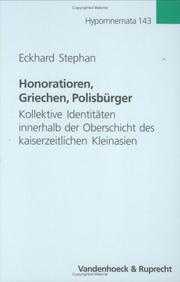
ISBN: 3525252420 9783525252420 Year: 2002 Volume: 143 Publisher: Göttingen Vandenhoeck & Ruprecht
Abstract | Keywords | Export | Availability | Bookmark
 Loading...
Loading...Choose an application
- Reference Manager
- EndNote
- RefWorks (Direct export to RefWorks)
Ethnicity --- Group identity --- Citizenship --- Ethnicité --- Identité collective --- Citoyenneté --- Provinces --- Provinces. --- -Ethnicity --- -Group identity --- -Collective identity --- Community identity --- Cultural identity --- Social identity --- Identity (Psychology) --- Social psychology --- Collective memory --- Ethnic identity --- Cultural fusion --- Multiculturalism --- Cultural pluralism --- Birthright citizenship --- Citizenship (International law) --- National citizenship --- Nationality (Citizenship) --- Political science --- Public law --- Allegiance --- Civics --- Domicile --- Political rights --- Law and legislation --- -Provinces --- Ethnicité --- Identité collective --- Citoyenneté --- -Ethnic identity --- Collective identity --- Elite (Social sciences) --- Turkey --- History --- Upper class --- Cities and towns --- Cities and towns [Ancient ] --- Greece --- Rome --- Ethnicity - Greece. --- Ethnicity - Rome - Provinces. --- Group identity - Greece. --- Group identity - Rome - Provinces. --- Citizenship - Rome.
Book
ISBN: 9781842172926 1842172921 Year: 2016 Publisher: Oxford Oxbow Books
Abstract | Keywords | Export | Availability | Bookmark
 Loading...
Loading...Choose an application
- Reference Manager
- EndNote
- RefWorks (Direct export to RefWorks)
"This book examines the question of identity in the Roman provinces of the western empire. It takes an innovative approach in looking at the wider discourses or ideologies through which an individual sense of self was learnt and expressed. This wide-ranging survey considers ethnic identity, status, gender, and age. Rather than constructing a paradigm of the 'ideal' of any specific aspect of personal identity, it looks at some of the wider cultural ideas which were drawn upon in differentiating groups of people and the variability within this. It focuses on the daily and mundane practices of everyday life through which identities were internalised and communicated"--Provided by publisher.
Identity (Psychology) --- Ethnicity --- Social status --- Gender identity --- Age groups --- Roman provinces --- Acculturation --- Assimilation (Sociology) --- Group identity --- Identité (Psychologie) --- Ethnicité --- Statut social --- Identité sexuelle --- Groupes d'âges --- Provinces romaines --- Assimilation (Sociologie) --- Identité collective --- Social aspects --- Provinces --- History --- Social conditions --- Antiquities --- Aspect social --- Histoire --- Conditions sociales --- Antiquités --- Rome --- Kulturelle Identität. --- Römisches Reich --- Westprovinzen. --- Social archaeology --- Antiquities. --- Social conditions. --- History. --- Identity (Psychology) - Social aspects - Rome - Provinces - History --- Ethnicity - Rome - Provinces - History --- Social status - Rome - Provinces - History --- Gender identity - Rome - Provinces - History --- Age groups - Rome - Provinces - History --- Roman provinces - Social conditions --- Roman provinces - Antiquities --- Social archaeology - Rome - Provinces --- Rome - History - Empire, 30 B.C.-284 A.D. --- Rome - History - Empire, 284-476
Book
ISBN: 9780521549943 9780521840620 0521549949 0521840627 Year: 2012 Publisher: New York : Cambridge University Press,
Abstract | Keywords | Export | Availability | Bookmark
 Loading...
Loading...Choose an application
- Reference Manager
- EndNote
- RefWorks (Direct export to RefWorks)
"In this highly-illustrated book, Mary T. Boatwright examines five of the peoples incorporated into the Roman world from the Republican through the Imperial periods: northerners, Greeks, Egyptians, Jews, and Christians. She explores over time the tension between assimilation and distinctiveness in the Roman world, as well as the changes effected in Rome by its multicultural nature. Underlining the fundamental importance of diversity in Rome's self-identity, the book explores Roman tolerance of difference and community as the Romans expanded and consolidated their power and incorporated other peoples into their empire. The peoples of the Roman world provides an accessible account of Rome's social, cultural, religious, and political history, exploring the rich literary, documentary, and visual evidence for these peoples and Rome's reactions to them"--Provided by publisher.
Ethnology --- Minorities --- Ethnicity --- Assimilation (Sociology) --- Acculturation --- Cultural pluralism --- Imperialism --- Anthropologie sociale et culturelle --- Minorités --- Ethnicité --- Assimilation (Sociologie) --- Diversité culturelle --- Impérialisme --- Social aspects --- Aspect social --- Rome --- Ethnic relations. --- Social conditions. --- Territorial expansion --- Relations interethniques --- Conditions sociales --- Expansion territoriale --- History --- Ethnic relations --- History. --- Territorial expansion. --- Nationale Minderheit. --- Acculturation. --- Assimilation (Sociology). --- Cultural pluralism. --- Ethnicity. --- Ethnology. --- Minorities. --- Social history. --- General --- Social aspects. --- Römisches Reich. --- Rome (Empire). --- General. --- Rome ancienne --- --Relations interethniques --- --Ethnologie --- --Minorité ethnique --- --Ethnicité --- --Assimilation, --- --Pluralisme culturel --- --Condition sociale --- --Impérialisme --- --Expansion territoriale --- --Ethnology --- Social conditions --- Minorités --- Ethnicité --- Diversité culturelle --- Impérialisme --- Ethnic minorities --- Foreign population --- Minority groups --- Persons --- Discrimination --- Majorities --- Plebiscite --- Race relations --- Segregation --- Colonialism --- Empires --- Expansion (United States politics) --- Neocolonialism --- Political science --- Anti-imperialist movements --- Caesarism --- Chauvinism and jingoism --- Militarism --- Cultural anthropology --- Ethnography --- Races of man --- Social anthropology --- Anthropology --- Human beings --- Ethnic identity --- Group identity --- Cultural fusion --- Multiculturalism --- Cultural diversity --- Diversity, Cultural --- Diversity, Religious --- Ethnic diversity --- Pluralism (Social sciences) --- Pluralism, Cultural --- Religious diversity --- Culture --- Cultural assimilation --- Socialization --- Emigration and immigration --- Culture contact --- Development education --- Civilization --- Social aspects&delete& --- Rim --- Roman Empire --- Roman Republic (510-30 B.C.) --- Romi (Empire) --- Byzantine Empire --- Rome (Italy) --- Culture contact (Acculturation) --- Ethnologie --- Minorité ethnique --- Assimilation, --- Pluralisme culturel --- Condition sociale --- Ethnology - Rome - History --- Minorities - Rome - History --- Ethnicity - Rome - History --- Assimilation (Sociology) - Rome - History --- Acculturation - Rome - History --- Cultural pluralism - Rome - History --- Imperialism - Social aspects - Rome - History --- Rome - Ethnic relations --- Rome - Social conditions --- Rome - Territorial expansion
| Listing 1 - 9 of 9 |
Sort by
|

 Search
Search Feedback
Feedback About UniCat
About UniCat  Help
Help News
News